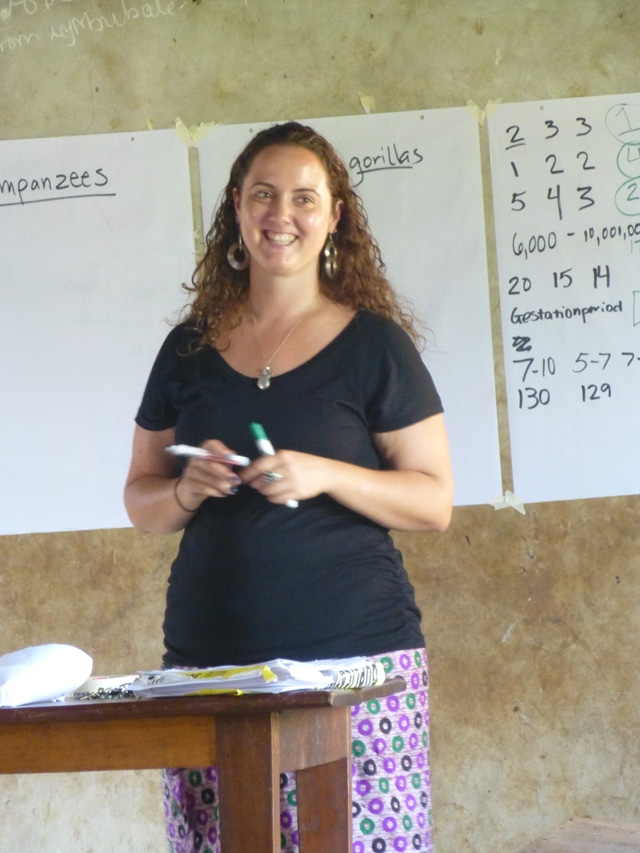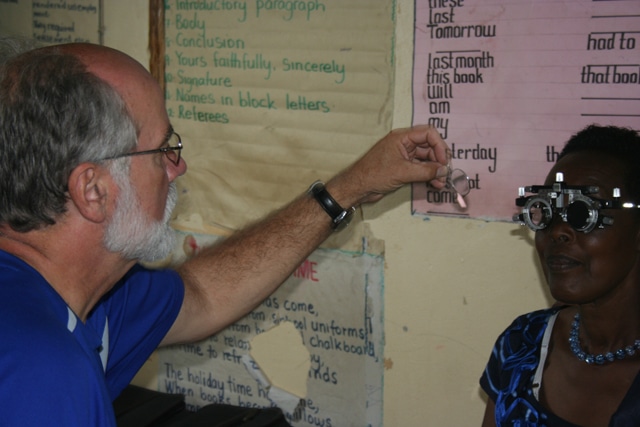 For more than six years, a Citizen Potawatomi Tribal member has worked in Uganda to promote conservation efforts in one of Africa’s fastest growing countries. Michelle Slavin spoke with the Hownikan about her journey from Washington State to Africa, what she is doing there and what it was like having her father, Clyde Slavin, travel over this past year to visit her and provide free optometry services to the local communities.
For more than six years, a Citizen Potawatomi Tribal member has worked in Uganda to promote conservation efforts in one of Africa’s fastest growing countries. Michelle Slavin spoke with the Hownikan about her journey from Washington State to Africa, what she is doing there and what it was like having her father, Clyde Slavin, travel over this past year to visit her and provide free optometry services to the local communities.
Where is your hometown?
“I am originally from Vancouver, Washington but often claim Seattle as my hometown. It’s easier than explaining Vancouver or Washington.”
Where did you graduate from?
“I graduated from the University of Washington in Seattle with a BS in Wildlife Science, American University in Washington D.C. with a Masters in International Affairs and the United Nations mandated University for Peace in Costa Rica with a Masters in Natural Resources and Sustainable Development.”
You’re currently UNITE’s Conservation Education Trainer in Uganda, can you give a description of what you do there?
“I started as UNITE for the Environment’s Conservation Education Trainer and in 2011 was promoted to director. I oversee the day-to-day management of the program on the ground in Uganda. This includes budgeting and reporting, grant writing, partnership development, communications, developing and facilitating teacher trainings, and developing and implementing an evaluation plan. Most people think I’m out having adventures on a daily basis but the reality is I spend about 80 percent of my time behind a desk.”
How does a Slavin from Washington State end up in Uganda?
“It wasn’t a straight line, that’s for sure! After university I wanted to gain work experience outside the U.S. so I joined the Peace Corps and worked in the Philippines for over two years as an environmental educator. It was there that I really fell in love with community conservation work and decided I wanted to make a career of it.
“I went back to Seattle to work and spend some much needed time with my friends and family before going to graduate school in Washington D.C. and Costa Rica. After getting my master’s I began working at the Smithsonian doing science education reform work in the Gulf States but it wasn’t long before I realized I really wanted to go back to working internationally. I saw an opening with the North Carolina Zoo to work with UNITE for the Environment in Uganda and I applied. I interviewed over the phone, got the job and within five weeks was on a plane heading for Uganda. Six years later, I’m still here!”
Why is your work there important?
“Conservation is the core of our wellbeing, and the well-being of wildlife and ecosystems. Conservation isn’t just about the environment, it’s about connections between public health, politics, education, poverty, consumption, research and the environment.
“Uganda has one of the highest population growth rates in the world and the national parks are becoming islands surrounded by people looking to survive and provide for their families. It also happens to be home to the largest
known chimpanzee population in all of Africa and nearly half the world’s remaining mountain gorillas.
“More often than not, communities living near these great ape habitats are asked to conserve the environment without being consulted or educated about why it is so important. UNITE for the Environment trains teachers
to integrate conservation education into Uganda’s national curriculum so that conservation becomes a daily message and habit instead of a special activity students take part in once or twice a month after school.
“During the training we also promote the use of student centered teaching methods to encourage studentsto think more critically about the conservation problems they face and are able to better able to address them. UNITE for the Environment doesn’t stop with the teachers though, we also take students on field trips to natural areas that align with the national curriculum.”
What are some of the challenges you face in trying to educate both those in Uganda and those of us farther afield about conservation?
“I think one of the biggest challenges educating people about conservation in both Uganda and elsewhere is the behavioral change component, which is essentially the goal of conservation education. Both Ugandans and Americans need to make changes in the way they view the environment and approach conservation, but they each face very different challenges.
“In the US I think a lot of the focus is on the consumption of energy and ‘stuff’ while in Uganda the focus is more on deforestation, waste management and poaching. A lot of it comes back to making the connection between our actions and the environmental impact, both now and in the future.
“Evaluating these behavioral changes is also a huge challenge, it’s difficult and expensive to evaluate behavioral
change so people don’t always do it, or don’t put a lot of effort into it. UNITE for the Environment has a pretty
thorough evaluation component and we are constantly assessing the best methods to use. Currently UNITE
for the Environment staff are visiting teachers and students at home to see if our messages are making it out of
the classroom and into the home.” 
What is it like having your father Clyde Slavin come over and conduct his optometry clinic for local residents there in Uganda?
“Having chosen a rather untraditional career it’s means a lot to me when my friends and family take an interest in
learning about where I live and the challenges I face both personally andprofessionally and there is no better way to do that than coming for a visit. I’m really lucky that my dad is so adventurous and willing to donate his time to helping others in less than ideal conditions.
“After one of the UNITE for the Environment trainings last year my dad provided free vision screenings and reading glasses for the teachers and they were so happy. The majority of the teachers live very far from any town that has an optometrist and even if they lived closer it’s unlikely they could afford to go see one. These teachers are my heroes—they go above and beyond what they are required to do so being able to see my dad helping them out was amazing.”
If you would like to learn more about Michelle Slavin’s work with UNITE, please visit their website tinyurl.com/UNITEFTE or follow them on Facebook (U.N.I.T.E. for the Environment), Twitter (@NCZooUNITE) or Instagram (UNITE4theEnvironment).
